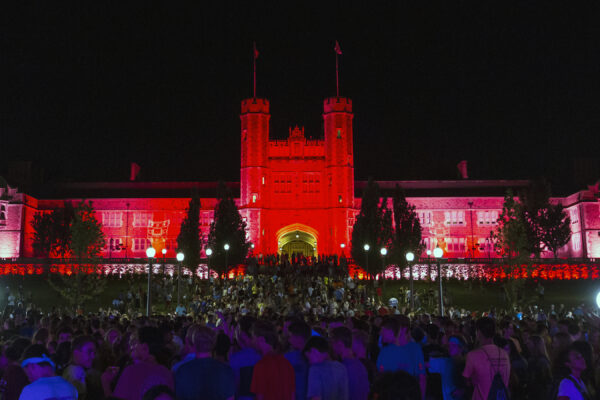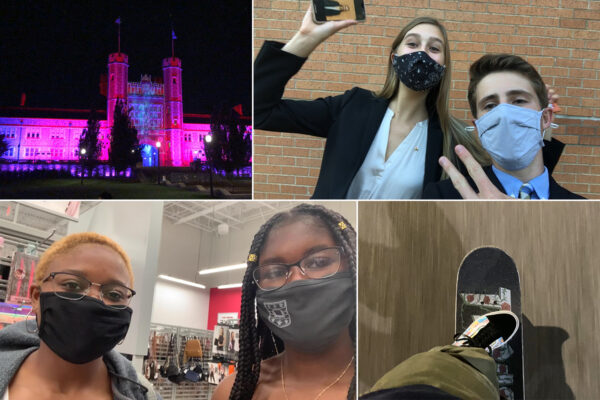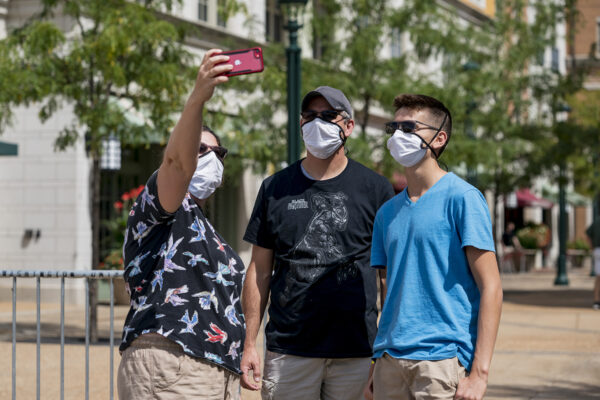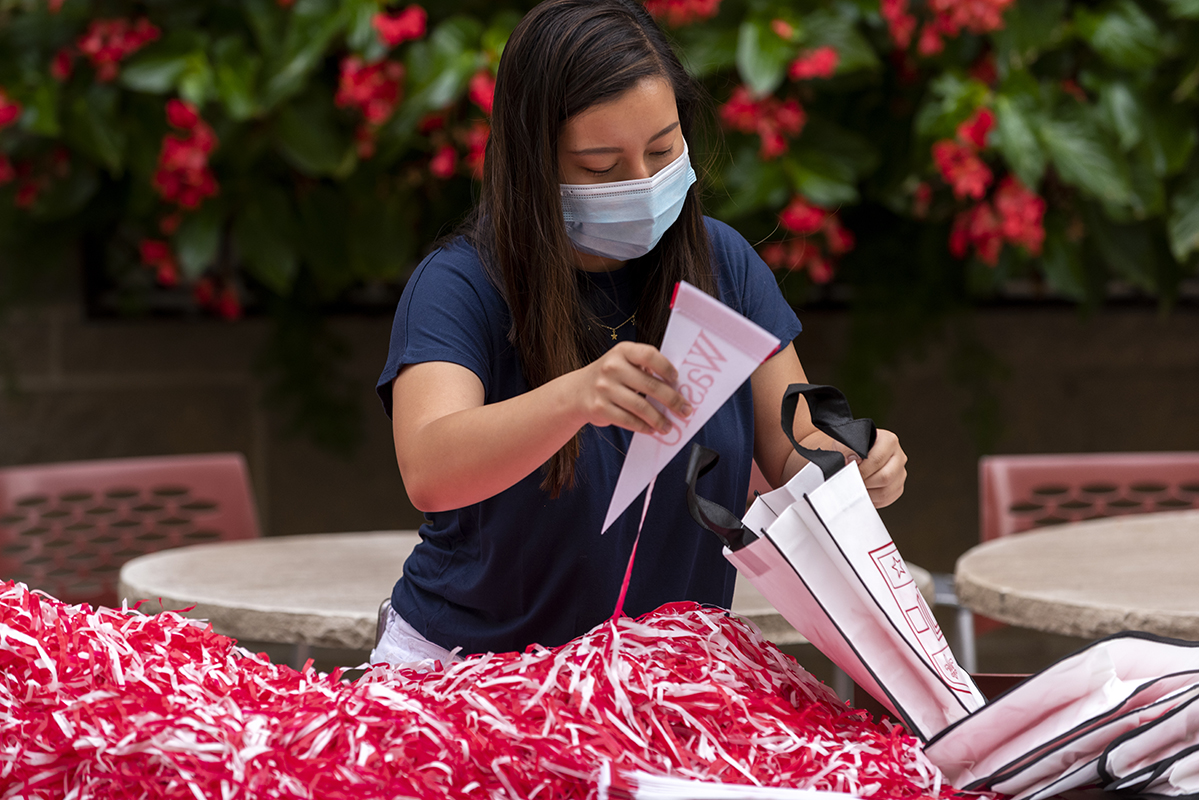
Starting Friday, Sept. 4, about 1,600 members of the Class of 2024 will arrive for a Bear Beginnings full of firsts.
Before arriving on the South 40, all students will be screened for COVID-19 using a saliva test developed by School of Medicine researchers. That′s certainly a first. Then they will move into single residences (another first) with the help of professional movers (also a first; typically student volunteers haul the mini-fridges and game consoles). Then it’s a week of orientation activities such as floor meetings, Common Reading Program discussions and Convocation — all virtual, all unprecedented.
And yet, what matters most has not changed at all, said senior Clarinda Tan, a member of the First Year Center executive board. Four years ago, Washington University Student Associate (WUSA) peer mentors and residential advisers cheered Tan as she rolled up to Danforth House. That’s when she knew that WashU could be her home.
“It’s the people that make this place special,” Tan said. “I will do whatever I can to make our students feel just like I did.”
Across campus, students, faculty and staff are finding creative ways to welcome the Class of 2024 despite ever-evolving public health directives and university policies, said Katharine Pei, director of the First Year Center. There have been calls from WUSAs, new academic peer mentorship programs, Spotify playlists for and by the Class of 2024 and gooey butter cake.
“The plans we have today are different from the one I had yesterday and are fundamentally different from the ones we had a month ago,” Pei said. “You can either freak out or you can be flexible and creative.”
Long before the university announced its fall plans, Pei and other campus leaders decided to communicate early and often with incoming students. In the spring, Undergraduate Admissions launched the WashU Admitted Students Network, a platform that connects new students to a WUSA peer mentor and a cohort of classmates. The First Year Center also introduced the new “Bear Beginnings: Summer Engagement Series,” which featured workshops like “The Art of Reading an Ancient Greek Vase,” with Arts & Sciences classics faculty, and “The Declassified Olin Survival Guide: How to Succeed in the B-School,” with Olin students, as well as activities such as yoga and virtual trivia.
Academic groups also reached out to their new peers, some of whom never had the opportunity to visit campus. The Sam Fox Peer Mentoring Program, for instance, hosted a virtual potluck, while EnCouncil created the new McKelvey Mentor Program. Meanwhile, Campus Life solicited student recommendations for the Class of 2024 Spotify playlists and helped organize, with Student Union, a five-day Activities Fair highlighting 408 student groups.
“No matter what this fall will look like, students still need to find their communities,” said Beth Doores, associate director for campus life. “We’re here for that.”
The Office of Residential Life also worked hard to prepare the South 40 for students, said Kawanna Leggett, interim associate vice chancellor and dean of students. Orange “Because” signs dot the walkways, reminding students to maintain safe physical distancing, while the housekeeping staff continues to sanitize rooms and common areas. Leggett does not know if the university can avoid the outbreaks that have derailed other universities’ fall semesters, but she hopes everyone’s shared desire to stay on campus will motivate the community to follow campus COVID-19 policies.
“Our students are our partners,’” Leggett said. “What we are saying is ‘Here are the things you can do to be safe. One: Wear your mask. Two: Practice physical distancing. Three: Take extra care for your personal hygiene and wash your hands.’ We are in this together.”
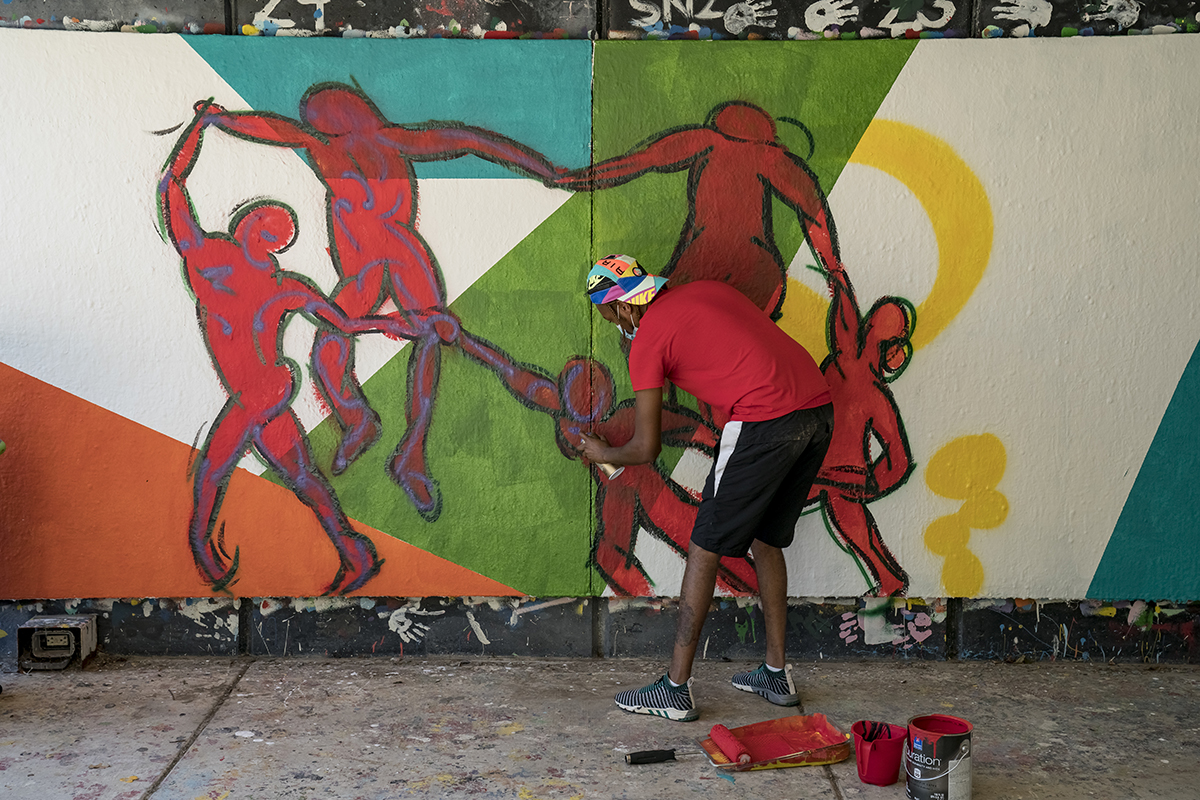
Traditions updated for the COVID-19 era
Those guidelines mean many first-year pastimes will have to wait. Hanging out at the Bear’s Den is a no-go; the dining room will remain closed for the upcoming weeks. Same for residential college cheers in the Swamp; the field is now home to a giant tent of study stations. But other traditions have been updated for the COVID-19 era.
There will be, of course, plenty of WashU schwag. Upon arrival, each first-year student will receive three goodie bags — one for move-in with the ultimate home-classroom accessory: a laptop camera cover; a second for Convocation, with a Washington University coin and a slice of gooey butter cake, a St. Louis staple. The third bag contains a “First Day of School” sign, which students can use for photographs to send home. Traditionally, first-year students stop under the Underpass for photos, but in the COVID era, students are discouraged from congregating. About 200 students who are studying remotely will receive the bags and participate in all Bear Beginnings programming.
Students also will continue to build relationships with their WUSAs through WUSA hours and meet new friends through First 40 virtual activities. Schools will offer virtual versions of tours and resources as well.
Meanwhile, Jen Smith, dean of the College of Arts & Sciences, will invite students to participate in a school tradition — the class quilt. For years, she has asked Arts & Sciences students to write a simple phrase — a goal, a dream or an expectation — onto a small square of fabric. Smith has hung the resulting quilts in her office. This year, students will receive a digital template, which they can decorate with an online painting tool.
“Making sure we had a quilt for the incoming class was really important to me,” Smith said. “Our tradition may have changed, but our excitement in welcoming each new student remains the same.”
WashU Response to COVID-19
Visit coronavirus.wustl.edu for the latest information about WashU updates and policies. See all stories related to COVID-19.
